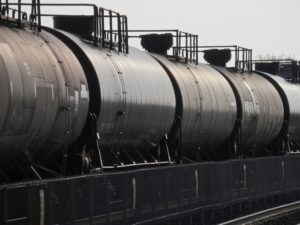
Federal officials addressed oil train safety issues by issuing an emergency order to lower speeds of trains carrying flammable liquids in urban areas, according to an AP story published in the Houston Chronicle, This safety-related change and others were announced last Friday by the U.S. Department of Transportation.
The pressure to improve safety on oil trains comes especially from places affected by oil shipments from the Bakken oil fields in North Dakota. However, the rules apply everywhere, including Texas. Major freight lines had already limited speeds on a voluntary basis for oil trains passing through what are called “high-threat” urban areas. But speed reduction is no longer voluntary with the new rules in place. The order extends to trains carrying other flammable liquids such as ethanol, something not covered by the voluntary agreement.
Additionally, the new order includes more types of rail cars, not just the old tankers covered under the voluntary agreement. So far in 2015, there have been four derailments of oil trains, all of them involving the newer cars constructed since 2011.
The order also included requirements to improve inspection of train wheels. A broken wheel is thought to be the cause of a March 5 derailment in Illinois. The order asks that inspections be conducted by the most senior and highly qualified inspectors.
Crude oil coming from the Bakken fields is more volatile and likely to ignite than other types of oil. The greatly increased amount of oil coming into the system from the Bakken and the apparent increase in explosions has highlighted the problem for railroads, the oil and gas industry and regulatory agencies.
The Department of Transportation is working on additional regulations that will require tank car design changes and braking systems. The new rules will probably be released in a next few weeks, according to the news story.
